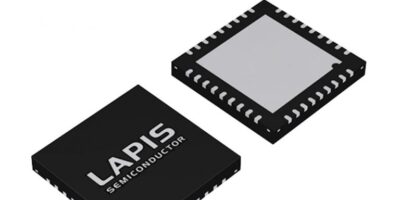Multi-band wireless communication LSI suits smart meters around world
A multi-band (sub-1GHz/2.4GHz) wireless communication large scale integration LSI chip, the ML7421, is optimised for applications requiring low power consumption over relatively long distances. Lapis Semiconductor, part of the Rohm group, says typical end users are smart meters, gas/fire alarms, smart agriculture and home/building security systems.
The use of smart meters has increased dramatically in Japan since 2015 and the Wireless M-bus system was launched in Europe. At the same time, there is a trend to collect and manage sensor data using wireless networks not only to optimise energy consumption and lighting in buildings but also for crime surveillance and disaster prevention. These wireless sensor networks are also increasingly used to improve productivity in agriculture.
The ML7421 covers the sub-1GHz frequency band (400MHz to 960MHz) and the 2.4GHz frequency band, providing universal compatibility. Previously, it was necessary to select wireless LSIs for each country and develop devices for them. By supporting the 2.4GHz band available world-wide, a single device can be deployed globally. Additionally, in environments where communication at 2.4GHz is unstable, long-distance Sub-1GHz communication is available. For this reason, 2.4GHz and Sub-1GHz can be used as bridged communication depending on the application or the environment. The ML7421 can be used in radio stations compliant to ETSI EN 300 200, FCC PART15, and ARIB STD-T66, T67, T108 with several packet handling functions based on Wireless M-Bus and IEEE802.15.4g.
It has stable wireless characteristics even under changing environmental parameters such as voltage and temperature fluctuations, says the company. Fluctuations over temperature (-40 to +85 degrees C) are only 0.5dB in Tx output power and 1.0dB in Rx sensitivity. A DC/DC converter, high-efficiency class-E power amplifier and a high-speed radio wave check function allow the average current consumption to decrease by 15 per cent compared with conventional Lapis products, to lower system power consumption and prolong battery life.
Improving delta-sigma ADCs makes it possible to achieve flexible data rate demodulation up to 300kbits per second for global usage, while improving receiver sensitivity. As a result, the ML7421 is suitable for equipment used outdoors such as smart meters and various IoT sensors. These stable characteristics make it possible to extend long-range communication further with high power amplifier, adds the company.




